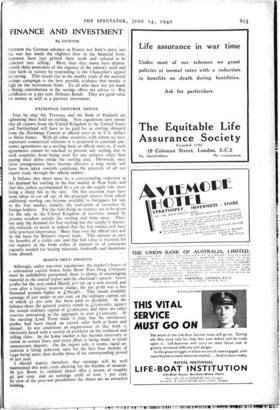FINANCE AND INVESTMENT
By CUSTOS
NEITHER the German advance in France nor Italy's entry into the war has made the slightest dent in the financial front. Investors have just gritted their teeth and refused to be jockeyed into selling. More than that, many have demon- strated their awareness of the urgency of the nation's need and their faith in victory by responding to the Chancellor's appeal for saving. This recent rise in the weekly totals of the national savings campaign is the best possible evidence that morale is high on the investment front. To all who have not yet made a fitting contribution to the savings effort my advice is: Buy certificates or 3 per cent. Defence Bonds. They are good value for money as well as a patriotic investment.
EXCHANGE CONTROL MOVES
Step by step the Treasury and the Bank of England are tightening their hold on sterling. New regulations now ensure that all exports from the United Kingdom to the United States and Switzerland will have to be paid for in sterling obtained from the Exchange Control at official rates or in U.S. dollars or Swiss francs. With all other countries with whom we have important commercial relations it is proposed to conclude pay- ments agreements on a sterling basis at official rates or, if such agreements cannot be reached, to prevent any sterling due to such countries from being used for any purpose other than paying their debts inside the sterling area. Obviously, once these arrangements have become effective a long stride will have been taken towards canalising the proceeds of all our export trade through the official market.
It follows that there must be a corresponding reduction in the demand for sterling in the free market in New York, and that this, unless accompanied by a cut on the supply side, must bring a sharp fall in the rate. On this occasion steps have been taken to cut off one of the principal sources from which additional sterling can become available to foreigners for sale in the free market, namely, the realisation of securities by foreign holders. For the time being no licences are to be given for the sale in the United Kingdom of securities owned by persons resident outside the sterling and franc areas. Thus, not only the demand for free sterling but the supply is drastic- ally reduced, so much so indeed that the free market will have little practical importance. More than ever the official rate will be the basis for Britain's export trade. This ensures at once the benefits of a stable rate and that full value is received for our exports in the form either of imports or of currencies urgently needed for buying materials, foodstuffs and munitions from abroad.
BOOTS DRUG PROFITS Although, under war-time regulations, the market's hopes of a substantial capital bonus from Boots Pure Drug Company must be indefinitely postponed, there is plenty of encouraging material in the annual report and the chairman's speech. Gross profits for the year ended March 31st set up a new record, and even after a heavier taxation charge, the net profit was a few thousand pounds higher at £782467. This meant available earnings of just under so per cent. on the ordinary capital, out of which 31 per cent. has been paid as dividend. In the balance-sheet the general reserve stands at £2,000,000, against the issued ordinary capital of £1,600,000, and there are other reserves amounting in the aggregate to over £1,000,000. At the meeting Lord Trent made it clear that the satisfactory profits had been based on record sales both at home and abroad. In war conditions an organisation of this kind is obviously faced with a variety of problems on the technical and selling sides. In the home market it has become necessary to ration in certain lines, and every effort is being made to avoid unnecessary imports. On the export side, it seems, rapid ex- pansion is being achieved, sales for the first four months of 1940 being more than double those of the corresponding period of last year. I should expect, therefore, that earnings will be well maintained this year, even allowing for the burden of taxation. At 35s. Boots 5s. ordinary shares offer a return of roughly 4i per cent. and an earnings yield of over 7 per cent. In view of the post-war possibilities the shares are an attractive holding.






























 Previous page
Previous page